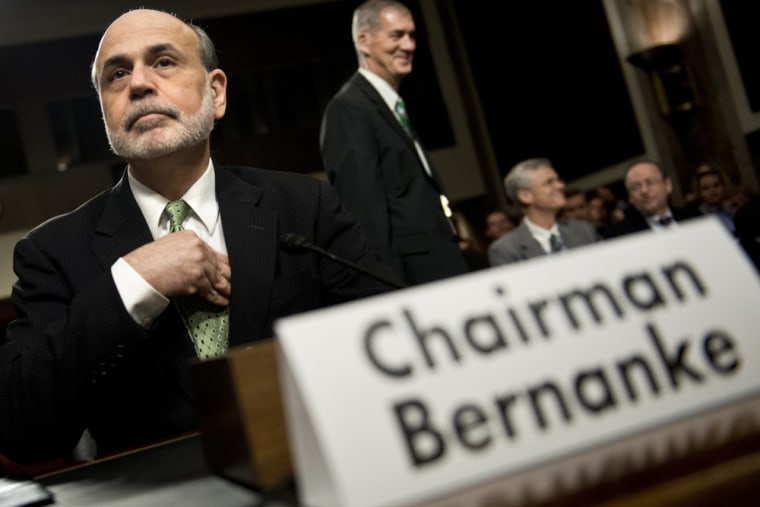
In meeting with lawmakers Thursday, Federal Reserve Chairman Ben Bernanke's message was clear: The Fed can steer, but Congress needs to step on the gas to keep the economy from rolling off a fiscal cliff.
"Monetary policy is not a panacea," Bernanke said in testimony to the Joint Economic Committee. He urged lawmakers to address pressing fiscal issues on which both parties have essentially declared a stalemate. Bernanke made it clear that while the Fed will take action if the domestic or global financial situations worsen, the central bank shouldn't be expected to do Congress' heavy lifting.
"I'd be much more comfortable if, in fact, Congress would take some of this burden from us," he said. Although committee members on both sides of the aisle unsuccessfully pressed Bernanke to outline specific legislative steps, the Fed chairman emphasized outcomes rather than tactics. In particular, he urged Congress to head off the prospect of a so-called "fiscal cliff" at the end of the year, when automatic spending cuts will kick in and tax cuts will expire if no action is taken.
Lawmakers and investors alike are starting to get apprehensive, and this fear factor could become an economic drag in its own right.
"It's always undesirable to have uncertainty about the fiscal path," said Kim Schoenholtz, an economics professor at New York University. "Economic growth requires investment, and that requires risk taking. Anything Congress can do to reduce uncertainty... would be helpful."
"The Fed and the chairman are right to point the finger" at Congress, said Michael Gapen, Barclays senior U.S. economist. "Lack of progress on the fiscal front in resolving some of these uncertainties have meant that firms are less willing to invest and hire."
Last Friday, the Labor Department reported the U.S. economy created a paltry 69,000 jobs in May while the unemployment rate rose to 8.2 percent. In his prepared remarks before the committee, Bernanke acknowledged that job growth had slowed and that it would take an acceleration of economic activity to reignite that growth.
Fitch Ratings has reiterated it will cut the nation's AAA credit rating next year if lawmakers can't pull together a real plan for tackling debt and deficits, Reuters reported Thursday, citing an analyst who pointed out that the United States is the only one of the world's top four economies with an escalating debt-to-GDP ratio. Rival ratings agency Standard & Poor's cut the nation's debt rating to AA-plus status last summer during the height of the debt-ceiling crisis.
Bernanke warned that failing to act on the spending cuts and tax hikes would be detrimental to the economy. Congress must "try to avoid a situation where you have a massive cut in spending and increase in taxes all hitting at one moment," he said.
"It seems clear that the situation is deteriorating at the global level," Barry Bosworth, an economist at the Brookings Institution, said via e-mail. "The big risk is what the political parties will do in the fall."
Altough Bernanke spoke in measured tones about the state of the U.S. economy, saying that it was continuing to grow moderately, his testimony came against the backdrop of a eurozone debt crisis that threatens to plunge Europe back into recession and perhaps drag the global economy along for the ride. China, the world's No. 2 economy, already is feeling the pain; it lowered benchmark interest rates by 25 basis points Thursday to stimulate domestic demand as its export-driven economy slows.
Although Rep. Jim DeMint, R-S.C., labeled Fed activities as "monetary activism," Brookings' Bosworth said Fed policymaking pales in comparison to what urgently needs to take place in Washington. "Any monetary policy change would be largely symbolic in the presence of the fiscal uncertainty," he said.